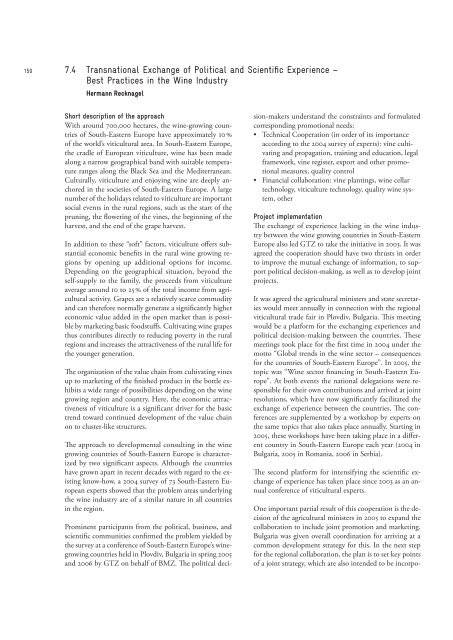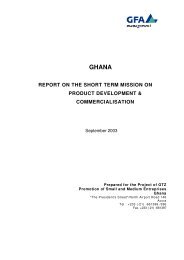Local/Regional Economic Development in South ... - Value Chains
Local/Regional Economic Development in South ... - Value Chains
Local/Regional Economic Development in South ... - Value Chains
You also want an ePaper? Increase the reach of your titles
YUMPU automatically turns print PDFs into web optimized ePapers that Google loves.
150<br />
7. Transnational Exchange of Political and Scientific Experience –<br />
Best Practices <strong>in</strong> the W<strong>in</strong>e Industry<br />
Hermann Recknagel<br />
Short description of the approach<br />
With around 700,000 hectares, the w<strong>in</strong>e-grow<strong>in</strong>g countries<br />
of <strong>South</strong>-Eastern Europe have approximately 10 %<br />
of the world’s viticultural area. In <strong>South</strong>-Eastern Europe,<br />
the cradle of European viticulture, w<strong>in</strong>e has been made<br />
along a narrow geographical band with suitable temperature<br />
ranges along the Black Sea and the Mediterranean.<br />
Culturally, viticulture and enjoy<strong>in</strong>g w<strong>in</strong>e are deeply anchored<br />
<strong>in</strong> the societies of <strong>South</strong>-Eastern Europe. A large<br />
number of the holidays related to viticulture are important<br />
social events <strong>in</strong> the rural regions, such as the start of the<br />
prun<strong>in</strong>g, the flower<strong>in</strong>g of the v<strong>in</strong>es, the beg<strong>in</strong>n<strong>in</strong>g of the<br />
harvest, and the end of the grape harvest.<br />
In addition to these “soft” factors, viticulture offers substantial<br />
economic benefits <strong>in</strong> the rural w<strong>in</strong>e grow<strong>in</strong>g regions<br />
by open<strong>in</strong>g up additional options for <strong>in</strong>come.<br />
Depend<strong>in</strong>g on the geographical situation, beyond the<br />
self-supply to the family, the proceeds from viticulture<br />
average around 10 to 25 % of the total <strong>in</strong>come from agricultural<br />
activity. Grapes are a relatively scarce commodity<br />
and can therefore normally generate a significantly higher<br />
economic value added <strong>in</strong> the open market than is possible<br />
by market<strong>in</strong>g basic foodstuffs. Cultivat<strong>in</strong>g w<strong>in</strong>e grapes<br />
thus contributes directly to reduc<strong>in</strong>g poverty <strong>in</strong> the rural<br />
regions and <strong>in</strong>creases the attractiveness of the rural life for<br />
the younger generation.<br />
The organization of the value cha<strong>in</strong> from cultivat<strong>in</strong>g v<strong>in</strong>es<br />
up to market<strong>in</strong>g of the f<strong>in</strong>ished product <strong>in</strong> the bottle exhibits<br />
a wide range of possibilities depend<strong>in</strong>g on the w<strong>in</strong>e<br />
grow<strong>in</strong>g region and country. Here, the economic attractiveness<br />
of viticulture is a significant driver for the basic<br />
trend toward cont<strong>in</strong>ued development of the value cha<strong>in</strong><br />
on to cluster-like structures.<br />
The approach to developmental consult<strong>in</strong>g <strong>in</strong> the w<strong>in</strong>e<br />
grow<strong>in</strong>g countries of <strong>South</strong>-Eastern Europe is characterized<br />
by two significant aspects. Although the countries<br />
have grown apart <strong>in</strong> recent decades with regard to the exist<strong>in</strong>g<br />
know-how, a 2004 survey of 73 <strong>South</strong>-Eastern European<br />
experts showed that the problem areas underly<strong>in</strong>g<br />
the w<strong>in</strong>e <strong>in</strong>dustry are of a similar nature <strong>in</strong> all countries<br />
<strong>in</strong> the region.<br />
Prom<strong>in</strong>ent participants from the political, bus<strong>in</strong>ess, and<br />
scientific communities confirmed the problem yielded by<br />
the survey at a conference of <strong>South</strong>-Eastern Europe’s w<strong>in</strong>egrow<strong>in</strong>g<br />
countries held <strong>in</strong> Plovdiv, Bulgaria <strong>in</strong> spr<strong>in</strong>g 2005<br />
and 2006 by GTZ on behalf of BMZ. The political deci-<br />
sion-makers understand the constra<strong>in</strong>ts and formulated<br />
correspond<strong>in</strong>g promotional needs:<br />
• Technical Cooperation (<strong>in</strong> order of its importance<br />
accord<strong>in</strong>g to the 2004 survey of experts): v<strong>in</strong>e cultivat<strong>in</strong>g<br />
and propagation, tra<strong>in</strong><strong>in</strong>g and education, legal<br />
framework, v<strong>in</strong>e register, export and other promotional<br />
measures, quality control<br />
• F<strong>in</strong>ancial collaboration: v<strong>in</strong>e plant<strong>in</strong>gs, w<strong>in</strong>e cellar<br />
technology, viticulture technology, quality w<strong>in</strong>e system,<br />
other<br />
Project implementation<br />
The exchange of experience lack<strong>in</strong>g <strong>in</strong> the w<strong>in</strong>e <strong>in</strong>dustry<br />
between the w<strong>in</strong>e grow<strong>in</strong>g countries <strong>in</strong> <strong>South</strong>-Eastern<br />
Europe also led GTZ to take the <strong>in</strong>itiative <strong>in</strong> 2003. It was<br />
agreed the cooperation should have two thrusts <strong>in</strong> order<br />
to improve the mutual exchange of <strong>in</strong>formation, to support<br />
political decision-mak<strong>in</strong>g, as well as to develop jo<strong>in</strong>t<br />
projects.<br />
It was agreed the agricultural m<strong>in</strong>isters and state secretaries<br />
would meet annually <strong>in</strong> connection with the regional<br />
viticultural trade fair <strong>in</strong> Plovdiv, Bulgaria. This meet<strong>in</strong>g<br />
would be a platform for the exchang<strong>in</strong>g experiences and<br />
political decision-mak<strong>in</strong>g between the countries. These<br />
meet<strong>in</strong>gs took place for the first time <strong>in</strong> 2004 under the<br />
motto “Global trends <strong>in</strong> the w<strong>in</strong>e sector – consequences<br />
for the countries of <strong>South</strong>-Eastern Europe”. In 2005, the<br />
topic was “W<strong>in</strong>e sector f<strong>in</strong>anc<strong>in</strong>g <strong>in</strong> <strong>South</strong>-Eastern Europe”.<br />
At both events the national delegations were responsible<br />
for their own contributions and arrived at jo<strong>in</strong>t<br />
resolutions, which have now significantly facilitated the<br />
exchange of experience between the countries. The conferences<br />
are supplemented by a workshop by experts on<br />
the same topics that also takes place annually. Start<strong>in</strong>g <strong>in</strong><br />
2005, these workshops have been tak<strong>in</strong>g place <strong>in</strong> a different<br />
country <strong>in</strong> <strong>South</strong>-Eastern Europe each year (2004 <strong>in</strong><br />
Bulgaria, 2005 <strong>in</strong> Romania, 2006 <strong>in</strong> Serbia).<br />
The second platform for <strong>in</strong>tensify<strong>in</strong>g the scientific exchange<br />
of experience has taken place s<strong>in</strong>ce 2003 as an annual<br />
conference of viticultural experts.<br />
One important partial result of this cooperation is the decision<br />
of the agricultural m<strong>in</strong>isters <strong>in</strong> 2005 to expand the<br />
collaboration to <strong>in</strong>clude jo<strong>in</strong>t promotion and market<strong>in</strong>g.<br />
Bulgaria was given overall coord<strong>in</strong>ation for arriv<strong>in</strong>g at a<br />
common development strategy for this. In the next step<br />
for the regional collaboration, the plan is to set key po<strong>in</strong>ts<br />
of a jo<strong>in</strong>t strategy, which are also <strong>in</strong>tended to be <strong>in</strong>corpo-



